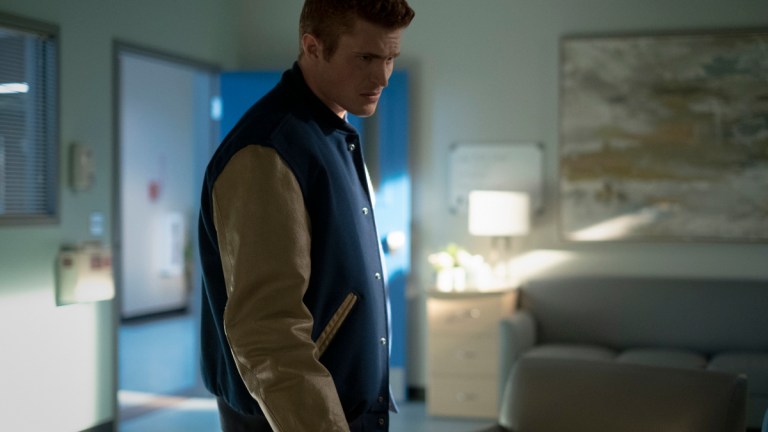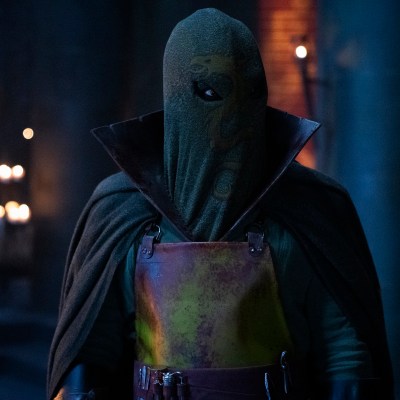How Stargirl Tackles Generational Trauma With Brainwave, Jr.
"Brainwave, Jr" makes for one of the most layered explorations of how villainy runs in families that Stargirl, or any other superhero TV show or movie, has yet attempted.

This article contains Stargirl spoilers. Don’t read if you aren’t caught up to episode 10.
Whether we want to be or not, we are all defined in some part by our parents; by their love or their lack of it, by the trauma they suffered or the compassion they were shown, and by the simple question of whether or not they were present in our lives at all.
Despite its superhero trappings, Stargirl is a series shaped by these experiences, with each member of the young cast struggling to deal with the legacy that their parents have left them. Courtney Whitmore is stuck between the reality of her father abandoning her and the fantasy that he might have died a noble death. Cindy Burman will go to any lengths–even murder–to gain the respect of the man who raised her. Rick is defined solely by his grief and mourning over his parents’ deaths. Beth’s own relationship with her mom and dad left her isolated from her own peers. Yolanda’s own family shunned her due to her own abuse, but this in turn inspired her to embrace her role as Wildcat. And that’s before we even get into the fact that Blue Valley’s parents are predominantly supervillains.
There is one story, though, that defines this conflict between our own personhood and our parents. It was a heartbreaking journey that spent time to create a truly conflicted tragic hero out of a flawed young man who in the newest episode ultimately made the right choice and paid for it with his life. Henry King Jr. was the only son of the supervillain known as Brainwave. Early on, the teen superhero series set him up as a potential antagonist for the burgeoning Justice Society. But as the season moved forward, Henry Jr. was at the heart of one of Stargirl‘s biggest thematic arcs: can we ever move past the horrors of what our parents have done?
Anyone who’s read DC’s Stars & S.T.R.I.P.E. comics might have an inkling that Courtney is hurtling towards her own reckoning with her parents, but as Brec Bassinger’s titular heroine has forged forward with her fight for justice, Jake Austin Walker has been crafting a heartbreaking and emotive performance that pays off beautifully in “Brainwave Jr.” Struggling to contain his own developing telepathic powers while also dealing with his father’s sudden comatose state, Henry Jr. was more of a background character until the last few episodes, with all signs pointing towards him becoming a villain. He was partially responsible for sharing Yolanda’s photos around school and making her a social pariah, he had a violent temper that often saw him bullying those around him, and, of course, his father is an evil supervillain.
Despite all of that, Walker brought a level of humility and compassion to the character which hinted at his ultimate role as Stargirl‘s tragic hero. Henry Jr. seemed like he was supposed to be unlikeable but I never managed to dislike him. In fact, the more I learned about his father and his cruelty as well as his apparent deep regret about what happened to Yolanda I began to hope he’d lead Blue Valley’s villain kids in an uprising against their parents. While that didn’t quite happen, the latest episode did allow us to see Henry Jr. show the kind of bravery it takes to do the right thing even when you know that it might be the last thing that you ever do.
Many of us have taken the time to try to save our parents, both figuratively and literally. Children are often left to try and make the best of carers who are lost to addiction or save those who are in abusive relationships. It’s a tough reversal of roles that’s far more regular of an occurrence than anyone admits, and in Stargirl the weight of that responsibility was showcased in a brutal way.
Read more
With Henry Jr. sure that his father could be better and was truly more than Brainwave, he saved his friends and stood in front of the man he loved, begging him to reconsider his actions. His belief that the person who had never done anything but hurt him had the capacity to change gave Henry the strength to ask his father to do just that. But sadly for Henry Jr., his father couldn’t make that sacrifice and instead sacrificed his own son simply to make a point. But even in his last moments, Henry Jr. refused to let his father and his cruelty win, telling his friends, “You were right, people are good, don’t let this change that.”
It was a devastating moment that opened up a bigger question for Stargirl, not just how do we live in the shadows of our parents but how do we survive them? Can we really escape their trauma and abuse? Their failings and fury?
In Henry’s case the answer was ultimately no, but his spirit and sacrifice broke the cycle of horror that his father had tried to instill in him to continue. There was a power in Walker’s performance that not only moved me but left an indelible impact on the show. It’ll be a shame to see him leave, but there’s another famous father who needs a son who can show him the way; we’d just have to jump over to DC’s chief competition at Marvel to see it.
Walker’s performance has been one of my favorite things about this season, and even before I began to care about Henry Jr. I had noticed that Walker bought exactly the mix of arrogance, sweetness, and blistering anger that a perfect Harry Osborn needs. I can’t help but constantly fancast–it is my curse–but as Henry’s arc moved forward I became more and more sure of Walker being the best possible bit of casting for the vital Spider-Man character.
It’s not just that he looks like the iconic Marvel character but Henry Jr. also shares the trauma of Peter Parker’s best friend: a tormented relationship with his father whose love he desperately grasps for. The difference here, of course, is that Henry ultimately chose his friends over the man who had hurt him. Despite that, there is plenty here to argue that Walker has the chops and ingenuity to take on the role of the son of Green Goblin if the MCU decides to go down that well-trodden road.
Even if this is the last superpowered role that Walker takes on, it was a powerful one and added layers of depth and gravitas that the sometimes light and silly show needs. It’ll be interesting to see the impact that this loss has on the gang and potentially Brainwave as we move towards the season finale and the inevitable battle between good and evil that Blue Valley is headed for.

